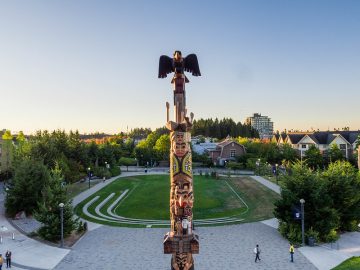The content on this page is current as of September 14, 2021. For further information on the ISP, including impact stories, toolkits, resources and the ISI Fund, please visit https://isp.ubc.ca/.
* * * *
UBC has begun to implement its Indigenous Strategic Plan (2020), taking a leading role in the advancement of Indigenous peoples’ human rights.
We are the first university in North America to commit to implementing the United Nations Declaration on the Rights of Indigenous Peoples, and to take a human rights-based approach to our Indigenous strategic framework.
Read: Indigenous Strategic Plan [PDF]
Download ISP: printer-friendly version [PDF]
The Indigenous Strategic Plan sets out a series of eight goals and 43 actions the university will collectively take in order to advance our vision of becoming a leading university globally in the implementation of Indigenous peoples’ human rights.
The plan is the university’s response to the United Nations Declaration on the Rights of Indigenous Peoples and the National Inquiry into Missing and Murdered Indigenous Women and Girls’ Calls for Justice. It is also UBC Vancouver’s response to the Truth and Reconciliation Commission’s Calls to Action.
The renewal of the Indigenous Strategic Plan began in 2017, which resulted in a draft Indigenous Strategic Plan in 2018. This document continued the work of the 2009 Aboriginal Strategic Plan.
From this point, the Indigenous Strategic Planning Team led a planning process to produce a final action plan, which ultimately was created with input from more than 2,500 students, faculty and staff across both campuses, including Indigenous students, faculty and staff, and Indigenous community partners.
The ISP is a living document and will be reviewed every three years in consultation with the UBC community and our Indigenous partners.
Related:
- Opinion: UBC demonstrates that we all have a role in upholding the rights of Indigenous peoples [Vancouver Sun]
- UBC community celebrates launch of new Indigenous Strategic Plan
- The Indigenous Strategic Plan: An Overview
- Indigenous Strategic Plan > Frequently Asked Questions
- UNDRIP @ UBC > Q&A
- ISP Celebration Event
